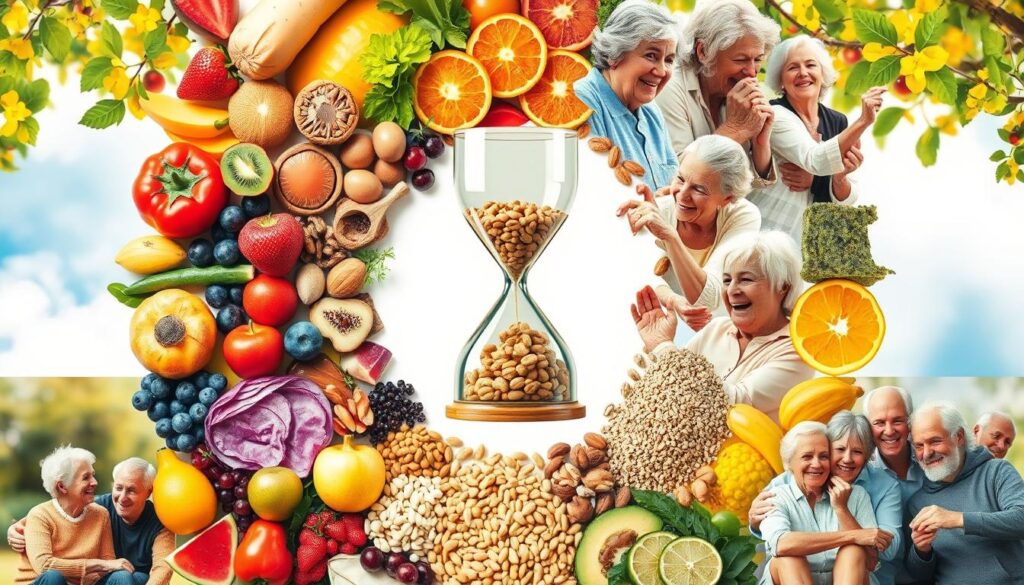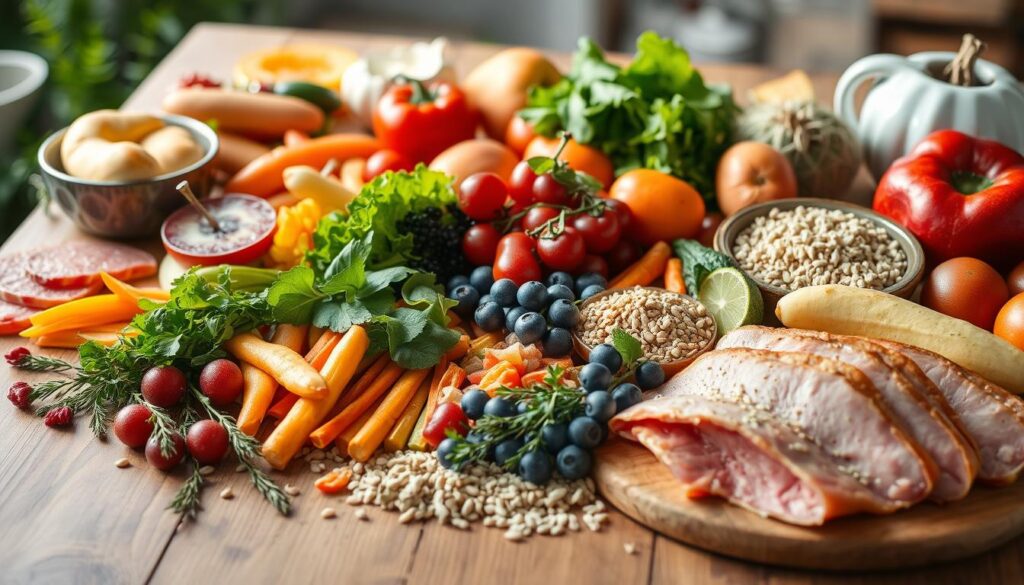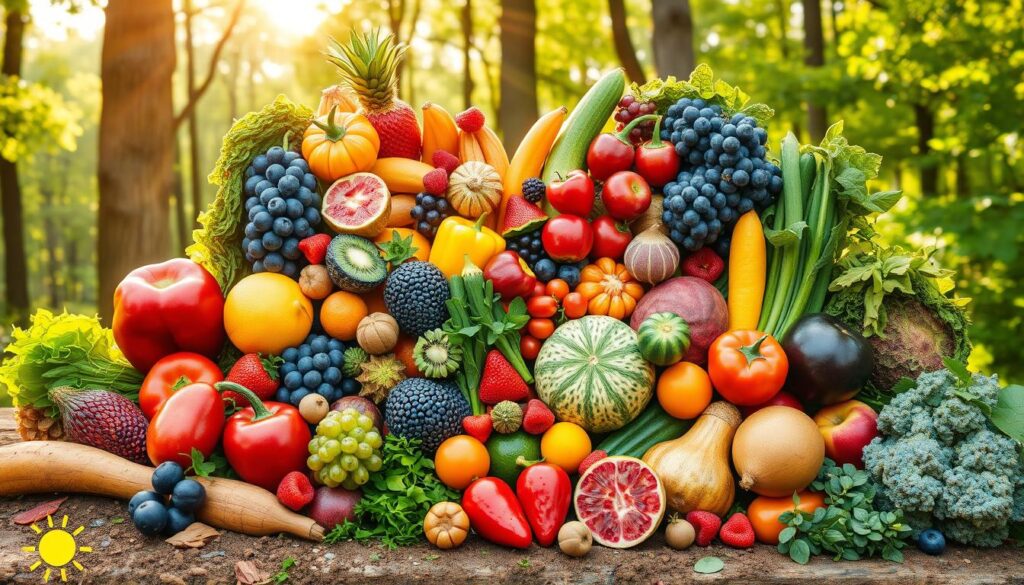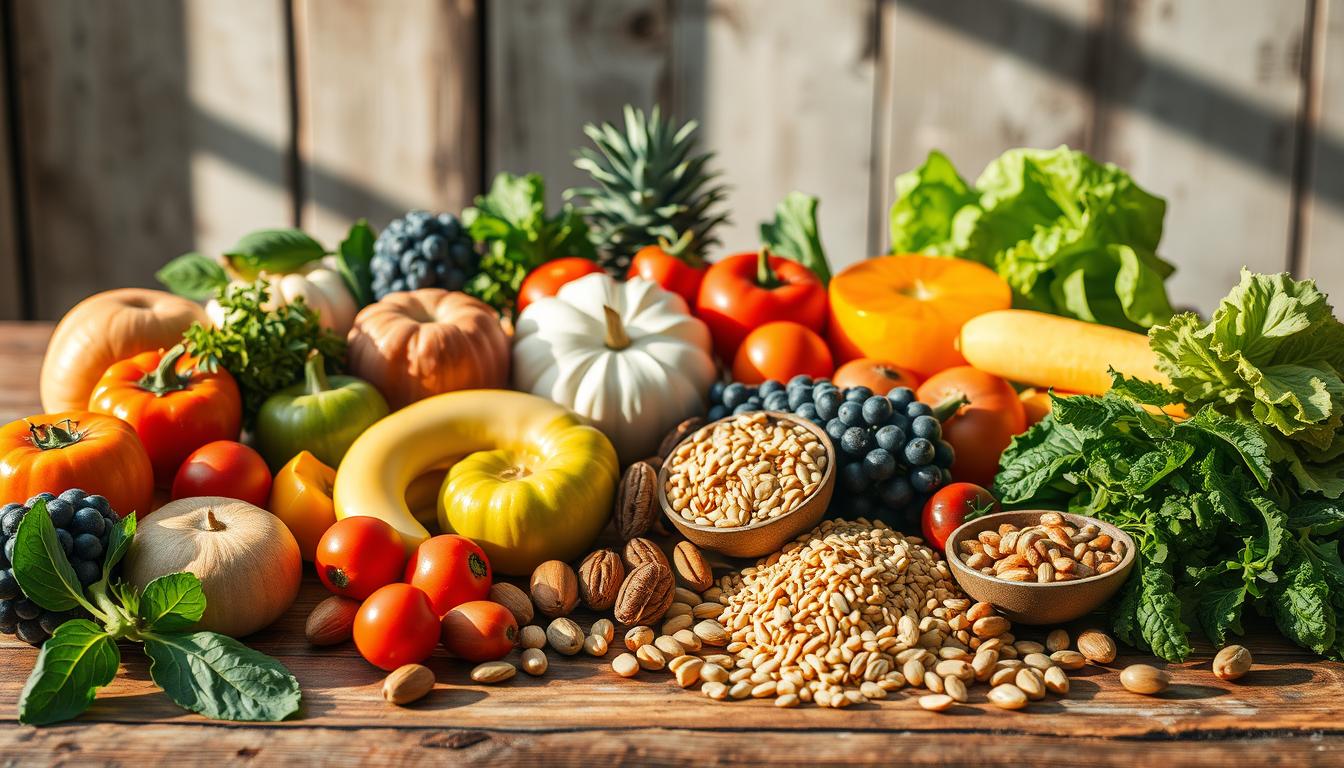Can the food we eat really help us live longer and healthier? This question often makes people think and talk. The food choices we make can surprise us by slowing down aging and keeping us active for more years. This article looks into how what we eat affects not just how long we live, but also how well we live.
Key Takeaways
- Rapamycin and trametinib can increase lifespan by up to 35%, particularly in females.
- A healthy vegan diet has been shown to lower biological age.
- Combining hyperbaric oxygen therapy with aerobic exercise enhances cardiac health.
- Microbiota transplants from younger to older individuals can improve aging markers.
- High-intensity interval training offers cognitive and physical benefits for older adults.
- Manuka honey shows potential against certain types of cancer in studies.
- Digital health platforms may contribute to improved overall health and longevity.
Introduction to Diet and Aging
As we get older, our bodies need different kinds of food. This makes studying how diet affects aging very important. Knowing how diet impacts aging helps us age well and keep a good quality of life. Studies show that what we eat directly changes our health and well-being.
The Importance of Nutrition in Aging
A balanced diet is key to dealing with aging issues. Older people often struggle with moving around, thinking clearly, and staying healthy. Good nutrition helps by giving them the nutrients they need for their health. Eating the right foods can make them move better and think clearer, making life better.
Common Aging Concerns Related to Diet
One big worry as we age is keeping our minds sharp. Eating foods full of antioxidants and omega-3 fatty acids helps keep our brains healthy. This can slow down mental decline. Also, keeping our joints healthy and muscles strong is linked to eating enough protein and eating well. Plus, our metabolism, like controlling blood sugar and heart health, is affected by what we eat. So, knowing how diet affects aging helps us make choices that keep us healthy and full of life.
The Role of Antioxidants and Aging
Understanding how antioxidants affect aging is key to keeping our cells healthy and our bodies strong. They help fight the effects of aging and keep our bodies in good shape as we get older.
How Antioxidants Work
Antioxidants protect our cells from oxidative stress, a major cause of aging. They stop harmful free radicals from damaging our cells. This keeps our cells healthy and lowers the risk of chronic diseases, helping us live longer.
Foods Rich in Antioxidants
Eating foods high in antioxidants is a great way to support your body. Here are some top antioxidant foods:
- Berries: Blueberries, strawberries, and raspberries are full of vitamins C and E.
- Dark chocolate: It has flavonoids, which are good for the heart.
- Nuts and seeds: Almonds, walnuts, and sunflower seeds are packed with vitamin E.
- Leafy greens: Spinach and kale are full of vitamins A and C.
- Green tea: It has catechins, which are linked to many health benefits.
Impact of Antioxidants on Cellular Health
Antioxidants do more than just prevent damage. They help our bodies repair themselves, boost our immune system, and make our skin look better. This reduces wrinkles and age spots. Eating a variety of antioxidants helps fight aging and keeps our cells healthy.
How does diet impact aging and longevity?
Many studies and real-life examples show that what we eat affects how we age and how long we live. Scientific research highlights several ways diet impacts aging and longevity.
Eating more plants can make us biologically younger. A study found that eating a vegan diet can make us younger at a cellular level. Also, exercises like high-intensity interval training (HIIT) can keep our brains sharp and protect our brain volume. This could mean living a healthier life for longer.
Research suggests, “Transplantation of fecal microbiota from young mice to older mice not only improved various metabolic parameters but also addressed multiple aging hallmarks.”

Some foods, like cereals and veggies, have a key nutrient called phytate. This nutrient helps keep our tendons healthy. It’s less common to get a condition called rotator cuff calcific tendonitis in people who eat more phytate. This shows the importance of eating whole foods and plants.
Studies are still looking into how diet affects aging and longevity. For example, combining certain supplements with exercise has helped improve muscle function in older mice. This suggests that some supplements could fight age-related muscle decline.
These findings show a strong link between diet and aging. Eating well is key to a long and healthy life. As research continues, we’ll learn more about how to live longer and healthier through diet.
The Benefits of a Balanced Diet for Longevity
A balanced diet is key for living a long life and aging well. It helps by giving you the right nutrients. This makes sure you stay healthy and enjoy life more.

Essential Nutrients for Healthy Aging
For a diet that helps you live longer, you need important nutrients. These nutrients support your body and lower the risk of getting sick as you get older. Vitamins, minerals, proteins, healthy fats, and antioxidants are crucial for keeping cells healthy and fighting off infections.
- Vitamins and Minerals: These are vital for many body functions and keeping your immune system strong.
- Proteins: They help fix and grow muscles, which is important as you age and muscle mass goes down.
- Healthy Fats: These fats are good for your brain and help reduce inflammation in your body.
- Antioxidants: They protect your cells from harm caused by free radicals.
“A balanced diet can significantly influence longevity and delay the onset of age-related diseases,” says Dr. Andrew Weil, a renowned physician, and nutrition expert.
Balanced Diet Guidelines
To support a long life, follow dietary guidelines that fit your health needs. Make sure your diet is varied and moderate.
- Eat a variety of fruits and vegetables to get many nutrients.
- Add whole grains and lean proteins to your meals.
- Reduce your intake of processed foods and sugars to avoid chronic diseases.
- Drink plenty of water all day to stay hydrated.
- Think about getting advice from a healthcare provider or dietitian for a diet plan that’s right for you.
Case Studies and Research Findings
Studies and research show how a balanced diet affects aging. For example, the Mediterranean diet is full of fruits, vegetables, whole grains, and healthy fats. It’s linked to living longer and having fewer chronic diseases like heart disease and diabetes.
In Blue Zones, where people live longer, diets focus on plant-based foods with some fish and lean meats. This diet has been shown to help people live longer and stay well into old age.
Learning how a balanced diet affects longevity helps us make better choices for a healthier life and aging well.
Vegan and Plant-Based Diets: Impacts on Biological Age
Many people are choosing vegan and plant-based diets to get healthier and live longer. Studies show these diets can make you biologically younger. This section looks at the science behind these diets, compares them, and talks about their benefits and risks.
Scientific Studies on Vegan Diets
A study looked at 21 pairs of twins, half on a vegan diet, half on an omnivorous diet for eight weeks. The vegan group showed big drops in biological age. The heart, hormonal, liver, inflammatory, and metabolic systems all got younger.

The vegan group also had less inflammation, shown by lower C-reactive protein levels. DNA methylation changes suggested a vegan diet could slow down aging.
Comparison with Other Diets
When we compare vegan and plant-based diets to others, the results are striking. The vegan diet made people biologically 0.63 years younger in just eight weeks. This was more than the omnivorous diet. Vegans also ate fewer calories and lost more weight.
But, the study had a small sample size and was short-term. So, we need more research to fully understand how these diets affect aging and health.
Health Benefits and Risks
Eating vegan can make you healthier in many ways. It can slow down aging, reduce inflammation, and boost organ health. This can lead to better metabolic health, lowering the risk of diabetes and heart disease.
But, a vegan diet can also have risks, like not getting enough vitamin B12, iron, or omega-3 fatty acids. With the right planning and supplements, these issues can be avoided. This way, you can enjoy the health benefits of plant-based diets and age well.
In summary, vegan diets seem promising for longevity, but we need more studies to confirm this. We must understand their effects on aging and health better.
Influence of High-Protein Diets on Longevity
Looking into high-protein diets shows us many important points. It’s key to weigh the good and bad sides. Finding the best protein sources is important for aging well.
Pros and Cons of High-Protein Diets
High-protein diets have many benefits, especially for older people. They help keep muscles strong, which is key for staying mobile and avoiding injuries. These diets also boost metabolism, helping keep energy up and overall health good.
But, there are downsides too. Too much protein from animals can be hard on the kidneys and may lead to heart disease. So, it’s important to eat in moderation and choose a variety of protein sources.
Recommended Protein Sources
Finding the right protein sources is crucial for aging well. Animal proteins like lean meats, fish, and dairy are full of important amino acids. But, adding plant-based options like legumes, nuts, seeds, and whole grains is also key. These foods offer great protein without the risks of some animal proteins.
High-protein diets are linked to living longer. Choosing a mix of protein sources can greatly help in aging healthily and living longer.
Fasting and Caloric Restriction: Effects on Aging
Exploring fasting and longevity shows us how these diets can change our lifespan and health. Studies show that fasting and eating less can slow down aging. They also start important processes that help us live longer.
Now, more people are looking into these practices as the world’s population gets older. The average life expectancy has gone up from 45.51 years in 1950 to 73.16 years in 2023. Experts think it will reach 81.88 years by 2100.
This increase in life expectancy means we need new ways to handle aging. Eating less and fasting can help by reducing oxidative stress and inflammation. They also help control how cells age.
One key way they work is by affecting the TOR pathway. This pathway helps control aging by responding to how much food we have. These diets do more than just cut calories. They can make us healthier by improving how our bodies use insulin, helping our hearts, and protecting our brains.
Studies in animals show that eating less and fasting can make us live up to 20% longer. The Okinawan diet is another example of how eating less and choosing the right foods can help us age better. It’s low in bad fats and processed foods. Eating this way for 12 weeks can help us lose weight and improve our health.
“The traditional Okinawan practice, known as ‘hara hachi bu,’ which means ‘stop eating when 80% full,’ embodies the principles of caloric restriction, showing significant benefits for weight management and healthy digestion.”
As we learn more about fasting and longevity, using these methods might become a key way to live better and longer. With more people aging, finding ways to age healthily is crucial.
The Impact of Processed Foods on Aging
Processed foods are becoming a big part of our diets because they’re easy to get and use. But, they don’t give us the nutrients our bodies need to stay healthy and live long. This is why what we eat greatly affects how long we live.
Negative Effects of Processed Foods
Processed foods can lead to health problems that make us age faster. Here are some big concerns:
- High in Additives and Preservatives: These chemicals can cause inflammation, which is linked to premature aging.
- Low Nutritional Value: Eating a lot of processed foods means you might not get the vitamins and minerals you need for good health.
- Sugar and Sodium: These are common in processed foods and can lead to heart disease and high blood pressure, which are linked to aging.
Strategies to Reduce Processed Food Intake
Reducing processed foods can help us age better and live longer. Here are some ways to eat healthier:
- Choose Whole Foods: Pick fresh fruits, veggies, whole grains, and lean proteins that are full of nutrients and lightly processed.
- Read Labels: Pay attention to what’s in the food. Stay away from items with lots of additives and preservatives you don’t recognize.
- Cook at Home: Making your own meals lets you pick the ingredients. This way, you can eat foods that are good for you.
- Snack Smart: Swap out processed snacks for healthier choices like nuts, seeds, or homemade granola.
- Avoid Sugary Drinks: Drinks like soft drinks and energy drinks are full of sugar or sugar substitutes that aren’t good for you. Drink water, herbal teas, or natural fruit juices instead.
By eating fewer processed foods and focusing on diet for aging, we can make better choices for our health and how long we live. Eating more whole, nutritious foods can slow down aging and make us feel better overall.
Conclusion
Our dietary choices greatly affect how long we live and our health. This article showed how food impacts aging and health. It talked about the importance of antioxidants and eating a balanced diet for a long life.
We learned that eating vegan or plant-based and controlling protein intake can make us biologically younger. Fasting and eating less can also help us live longer. But, eating too many processed foods is bad for our health.
So, what we eat matters a lot for how we age. Choosing foods high in antioxidants, eating a balanced diet, and avoiding processed foods helps. By making these choices, we can live healthier and longer.
Let’s make smart food choices for a better life. Every decision we make at the table affects our aging process. By eating right, we can live longer and healthier. Let’s start making better food choices today for a better tomorrow.
FAQ
How does diet impact aging and longevity?
Diet is key to aging well and living longer. Eating the right foods helps keep cells healthy, lowers inflammation, and boosts metabolism. This can make us healthier and live longer. By eating foods full of nutrients and avoiding bad ones, we can slow down aging.
What are the key nutrients necessary for healthy aging?
For healthy aging, we need antioxidants, omega-3 fatty acids, fiber, vitamins D and B12, and minerals like calcium and magnesium. These nutrients keep cells healthy, bones strong, brains working well, and muscles strong.
How do antioxidants affect aging?
Antioxidants fight off oxidative stress by neutralizing free radicals. These can harm cells and speed up aging. Eating foods high in antioxidants like berries, nuts, greens, and dark chocolate helps protect cells and prevent age-related problems.
Are vegan and plant-based diets beneficial for aging?
Yes, vegan and plant-based diets are good for aging. They’re linked to fewer chronic diseases, less inflammation, and better metabolism. But, make sure to get enough B12, iron, and omega-3s.
What is the role of protein in aging?
Protein is crucial for keeping muscles strong, metabolism healthy, and tissues repaired. It’s important for aging well. Good protein sources are lean meats, fish, beans, and dairy.
How do fasting and caloric restriction affect aging?
Fasting and eating less can start processes that help us live longer and healthier. They can improve cell repair, reduce inflammation, and better metabolism. This might slow aging and increase lifespan.
What are the effects of processed foods on aging?
Processed foods are bad for aging because they have lots of unhealthy fats, sugars, and preservatives. Eating them often can cause chronic inflammation, metabolic problems, and increase the risk of diseases. Eating whole, nutrient-rich foods is better for aging well.
How can I integrate foods rich in antioxidants into my diet?
Adding antioxidant-rich foods to your diet is easy. Eat a mix of fruits and veggies like berries, oranges, spinach, and kale. Snack on nuts, drink green tea, and use spices like turmeric and cinnamon in your cooking.
What dietary patterns are most associated with longevity?
Eating like the Mediterranean diet, plant-based, or whole-food, plant-rich diets is linked to living longer. These diets focus on fruits, veggies, whole grains, nuts, seeds, and healthy fats. They limit processed foods and red meat, helping with health and longevity.
What are some balanced diet guidelines for healthy aging?
For healthy aging, eat a mix of whole foods, focus on fruits and veggies, and include lean proteins and whole grains. Drink plenty of water and avoid processed foods, sugars, and unhealthy fats to support longevity and health.
